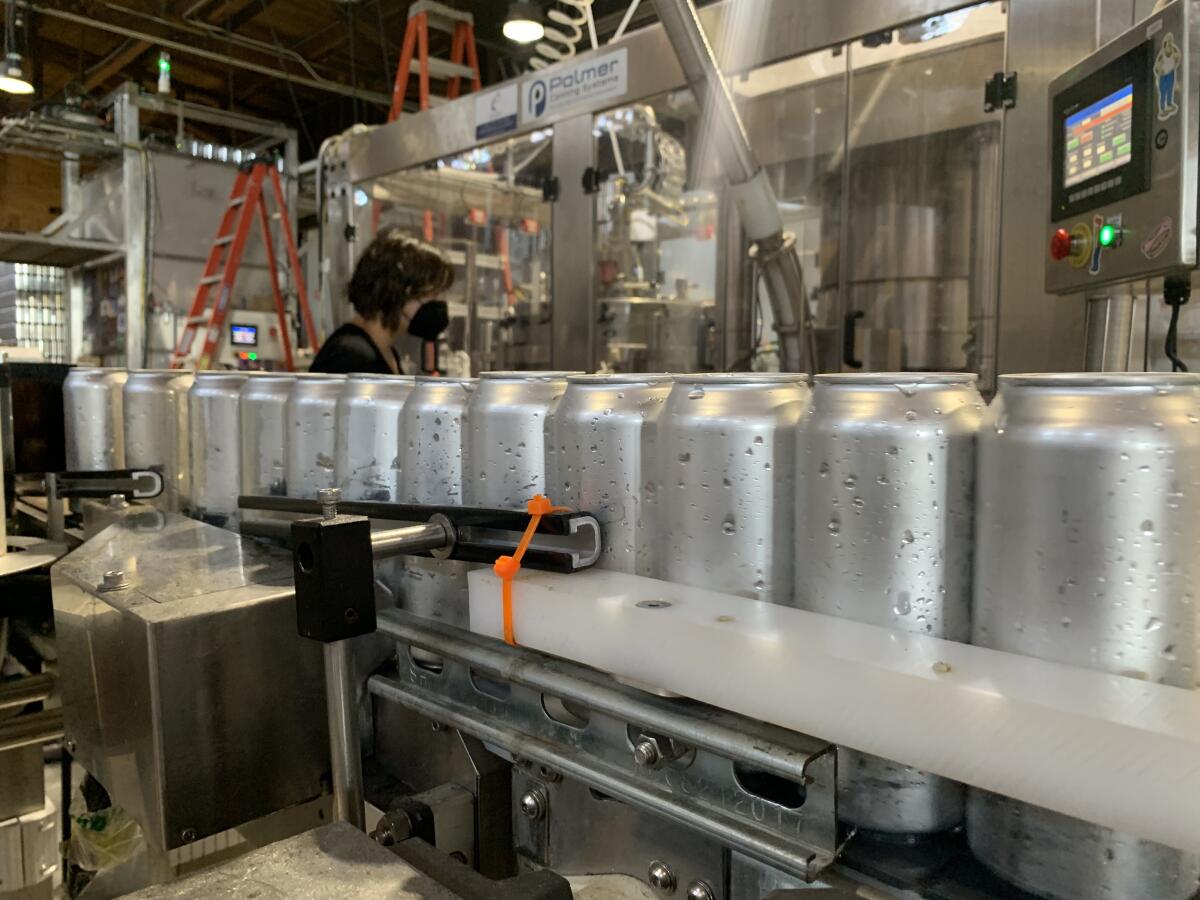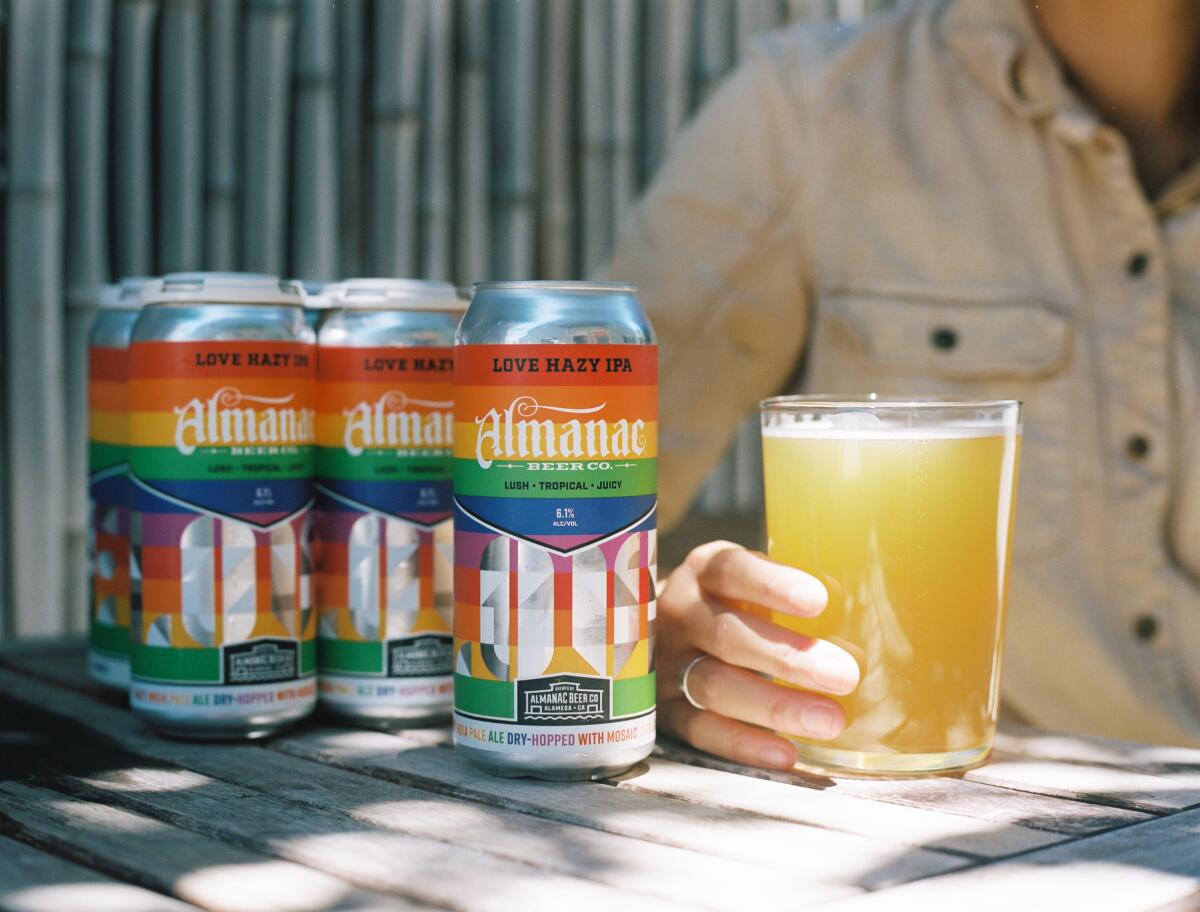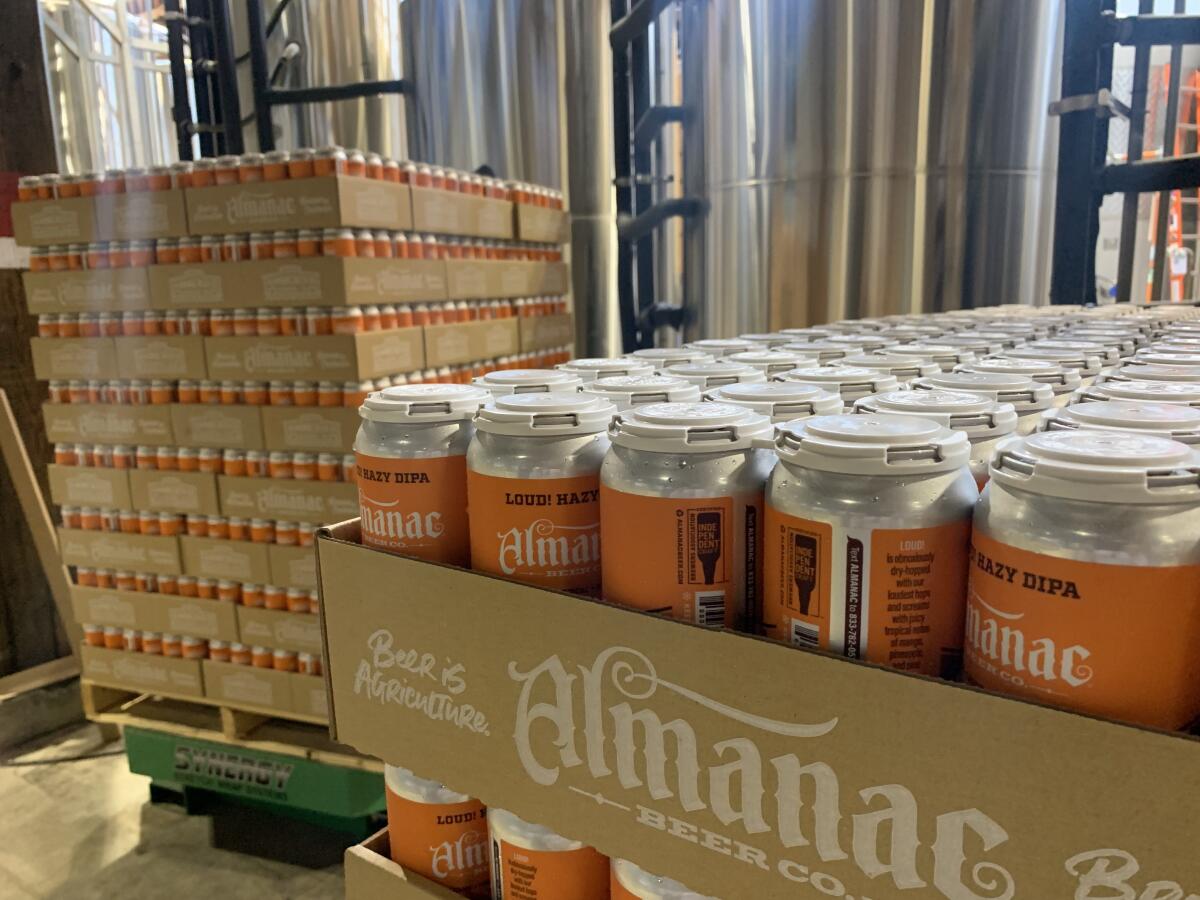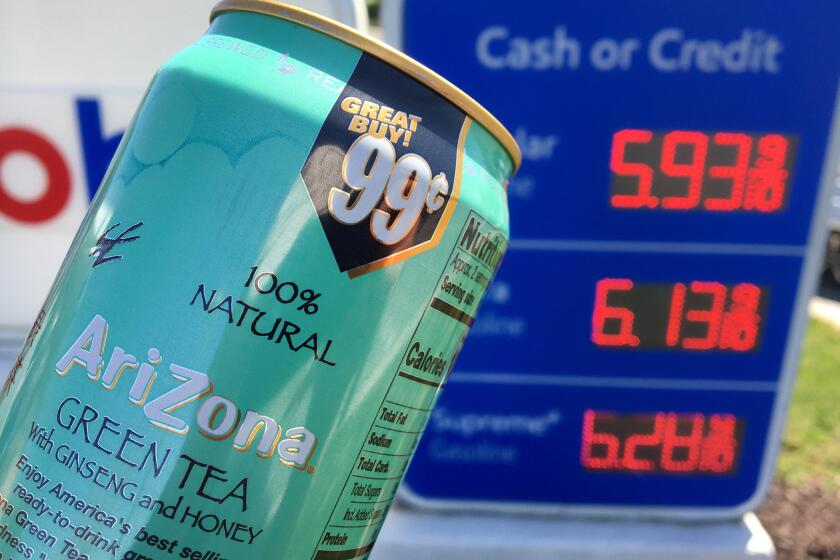Brewers need cans. California’s broken recycling system is making them hard to find

Cindy Le, the operations director at Almanac Beer Co. in Alameda, had customers lining up for her Black Magic IPA and Peaceful Pils this spring. She was just running out of ways to sell it.
Cans are in short supply nationally, creating an unforeseen headache for brewers and driving up prices for drinkers. A variety of factors are driving the shortage, including pandemic lockdowns that curtailed manufacturing, supplier upheavals and a canned cocktail boom that increased demand for aluminum.
Another reason: California’s creaking recycling system can’t collect enough cans, one consequence of a program that has been crippled by redemption center closures and out-of-date policies that have made it harder for people to recycle effectively.
The chronic shortage highlights how an overlooked link in the supply chain — trash — can hamstring a beloved, and booming, industry.
About 73% of an aluminum can comes from recycled scrap. As demand for canned beverages boomed in recent years, the state’s patchwork of recycling centers and recovery facilities just couldn’t keep pace.
In the last five years, California’s recycling rate for aluminum cans has fallen 20%, from 91% in 2016 to 73% in 2021, according to data from the California Department of Resources Recycling and Recovery, or CalRecycle.

“The problem that we have, particularly in the United States on cans, is that we don’t recycle them enough,” said Matt Meenan, vice president of external affairs at the Aluminum Assn. The overall can recycling rate in the U.S. is 45%, meaning that more than half of the cans wind up in landfills.
In California, the situation has deteriorated precipitously. In 2016, according to the state’s data, slightly more than 766 million aluminum cans wound up in landfills or never got recycled. Last year, the number was 2.8 billion. That’s enough cans to fill about 31,000 backyard swimming pools.
Experts said the beer business could come to a standstill without a steady supply of cans, and smaller businesses are the most vulnerable.
Tall cans of AriZona iced tea have cost 99 cents since 1992. The family behind the company says it’s committed to that price even as the prices of aluminum and corn syrup climb higher.
“[If] we don’t have beer to send to our distributors, we don’t have beer to sell over the bar in our tap room,” Le said. “It creates that domino effect of us not being able to sell beer or make money. That’s the real disruption.”
Amid the shortage, one of the biggest can makers in the U.S, Broomfield, Colo.-based Ball Corp., said last fall that it would no longer handle small or even mid-size orders. “Ball implemented a minimum order of five truckloads, which is like 5 million cans,” said Bart Whipple, supply-chain manager at Sierra Nevada Brewing Co. in Chico. “[For] smaller places, that’s a lifetime supply.”
That set off alarms at Huntington Beach-based Beachwood Brewing.
“Ball gave us essentially a two-week notice that we had to order all the cans for the next year,” co-owner and brewmaster Julian Shrago said. He decided to spend much of the company’s cash reserves on the cans and paid upfront. And still, it wasn’t clear when his supply would arrive.
Industrywide, the issue with vendors was “‘you can’t get this now,’ you’re going to have to wait twice as long,” Shrago said. “Then it became three times as long and then four times as long. It wasn’t that we weren’t able to get products; our lead times increased and our cost increased.”
Both Beachwood Brewing and Almanac Beer Co. scrambled to get what cans they could, paying a premium and averting a business standstill. “If we weren’t able to can beer, then we had no beer to sell,” said Le, who two years ago was paying 13 cents a can. By this spring, cans were selling for 22 cents each. With roughly 1.86 million cans purchased annually, Almanac’s can costs shot up by approximately $167,400 in less than two years.
When costs balloon that way, “eventually we have to pass it down to the customer,” Shrago said.
Although the can crisis exploded during the pandemic, it has been years in the making.
The rise of ready-to-drink cocktails,such as those by White Claw and Truly, were already creating more competition for aluminum.

At the same time, the biggest source of supply, California’s recycling system, was breaking down.
In 2015, there were 2,245 buyback centers, or places where consumers could go to claim their nickel deposit on a bottle or can in the California Refund Value program. Those centers make their money by selling aluminum — as well as paper, glass and some plastic — on the scrap market. The price of scrap metals caved that year, falling 30.8%, and the centers began to close en masse.
Some 420 centers couldn’t pay their bills and closed. An additional 600 shuttered during the next five years. CalRecycle, the state agency in charge, did little to stem the tide, according to critics.
When there are no redemption centers nearby, California’s “Bottle Bill,” AB 2020, requires that grocery stores and supermarkets step in and offer customers a nickel for every can they turn in. But few retailers are willing to accept them, and enforcement is lax.
A 2019 investigation of 50 Los Angeles-area stores by consumer rights group Consumer Watchdog found that two-thirds of the stores outright refused to issue CRV refunds. The group took a few bottles to stores required by state law to issue refunds and tracked which ones did or did not give nickels back.
For the majority of Californians, the only option to recycle is to toss the can into the blue bin that is part of municipal trash pickup, along with paper, plastic and other recycling items. But this so-called “single stream” option is costly and inefficient.
“We have a single bin for curbside recycling, and we know that most of that ends up being contaminated,” said Sen. Bob Wieckowski (D-Freemont). “Cardboard doesn’t mix well with mayonnaise jars.”
As much as a third of the material collected in single-stream containers ends up in landfills because it either can’t be properly sorted or is contaminated with non-recyclable materials.
Watch L.A. Times Today at 7 p.m. on Spectrum News 1 on Channel 1 or live stream on the Spectrum News App. Palos Verdes Peninsula and Orange County viewers can watch on Cox Systems on channel 99.
Wieckowski is the author of SB 38, a bill that seeks to combat redemption fraud, updates requirements for exemptions from the state’s recycled content standards and addresses contamination issues. It will be heard in the Assembly Appropriations Committee when the Legislature reconvenes in August.
It’s one of several bills being considered in the state Legislature that seek to overhaul the state recycling system, such as SB 372, which includes wine and liquor bottles.
Meanwhile, cans headed to landfills are worth more than ever on the spot market right now.
Aluminum scrap cost $2,354.78 per ton in March, up 62% year over year, according to American Metal Market data. Prices for primary aluminum, the material used to make 27% of a new can, shot up 68% during the same period, to $3,475 per ton from $2,069 per ton.
Global brands are also feeling the pinch. Harold van den Broek, Amsterdam-based Heineken’s chief financial officer, told investors in February that it would be raising prices in part to offset “soaring expenses related to aluminum.”
The rising prices pose a challenge for breweries, even with the can supply flowing more regularly.
Almanac has an agreement with a packaging broker that secures its can supply for now. “The con side is, if there’s any price increases, then we’re stuck with that,” Le said.
More to Read
Inside the business of entertainment
The Wide Shot brings you news, analysis and insights on everything from streaming wars to production — and what it all means for the future.
You may occasionally receive promotional content from the Los Angeles Times.












